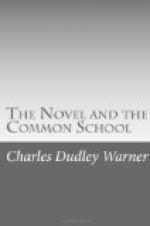Now, this radical defect can be easily remedied if the school authorities only clearly apprehend one truth, and that is that the minds of children of tender age can be as readily interested and permanently interested in good literature as in the dreary feebleness of the juvenile reader. The mind of the ordinary child should not be judged by the mind that produces stuff of this sort: “Little Jimmy had a little white pig.” “Did the little pig know Jimmy?” “Yes, the little pig knew Jimmy, and would come when he called.” “How did little Jimmy know his pig from the other little pigs?” “By the twist in his tail.” ("Children,” asks the teacher, “what is the meaning of ’twist’?”) “Jimmy liked to stride the little pig’s back.” “Would the little pig let him?” “Yes, when he was absorbed eating his dinner.” ("Children, what is the meaning of ’absorbed’?”) And so on.
This intellectual exercise is, perhaps, read to children who have not got far enough in “word-building” to read themselves about little Jimmy and his absorbed pig. It may be continued, together with word-learning, until the children are able to say (is it reading?) the entire volume of this precious stuff. To what end? The children are only languidly interested; their minds are not awakened; the imagination is not appealed to; they have learned nothing, except probably some new words, which are learned as signs. Often children have only one book even of this sort, at which they are kept until they learn it through by heart, and they have been heard to “read” it with the book bottom side up or shut! All these books cultivate inattention and intellectual vacancy. They are—the best of them—only reading exercises; and reading is not perceived to have any sort of value. The child is not taught to think, and not a step is taken in informing him of his relation to the world about him. His education is not begun.
Now it happens that children go on with this sort of reading and the ordinary text-books through the grades of the district school into the high school, and come to the ages of seventeen and eighteen without the least conception of literature, or of art, or of the continuity of the relations of history; are ignorant of the great names which illuminate the ages; have never heard of Socrates, or of Phidias, or of Titian; do not know whether Franklin was an Englishman or an American; would be puzzled to say whether it was Ben Franklin or Ben Jonson who invented lightning—think it was Ben Somebody; cannot tell whether they lived before or after Christ, and indeed never have thought that anything happened before the time of Christ; do not know who was on the throne of Spain when Columbus discovered America—and so on. These are not imagined instances. The children referred to are in good circumstances and have had fairly intelligent associations, but their education has been intrusted to the schools. They know nothing except their text-books, and they know these simply for the purpose




